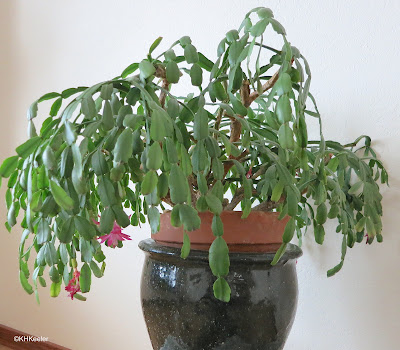"Seriously," said Junior the Christmas cactus, wise in the ways of humans after decades as a houseplant, "What humans call history is just a list of past attempts to capture plants. You tell it as if heads of state or armies that were responsible, but, really, possessing particular plants is what has always motivated humans."
"Huh?" I said.
 |
| Junior, a Christmas cactus |
"Where should I start?" they asked. "The key to what you call civilization was agriculture. From that came cities and countries. Tell me that isn't all about plants?"
"Not all cultures do agriculture, even today," I countered.
"Yes, and those people, hunters and gatherers, care about plants; in fact most treat plants better than "civilized" people. Non-agricultural peoples know plants really well and are careful not to over-gather. Their histories tell cautionary tales of the bad outcomes of over-harvesting."
"I grant the Age of Exploration (1400-1750 or so) began with looking for plants, that is, spices," I said.
Cactus cladodes bobbed in agreement.
"But, after that, not so much, I think," I said.
Junior responded sharply, "The last 400 years is dominated by Europeans and Americans scouring the earth for wonderful new plants, interfering in others' lives in the process. Sometimes the land they wanted for the plants had to be taken by force. For shame! But, it was for plants! Spices, timber, land for planting sugar. Plants.
"The idea that that is over is a delusion." Junior continued. "Consider just my lifetime, the last 180 years! This was a time when the English and Americans thought they were the masters of the earth. They tell history as if was about them. But they were seeking plants.
"Marvelous plants for their houses, like me!
"Plants for their yards, like ever-blooming roses and blanket flower.
 |
| tea plants growing in China |
"But also, major commodities. Tea for example. The Chinese have drunk tea for 4000 years but it was unknown in Europe before 1500 (link). Tea is persnickety and only grows in cool tropical mountainsides. When it became vastly popular in England in the early 19th century, it caused a very unfavorable balance of trade between China and England. England's responses all were about controlling tea. China barred them from taking any of the plants or learning how to process the leaves. England looked for potential tea-growing regions in India, which they had just conquered. England sent "plant hunters" into China illegally, to learn methods and steal the plants. Meanwhile, they tried making tea from wild tea plants in the foothills of the Himalayas. Third, they offered opium, grown in British-conquered Afghanistan, to Chinese people, over the objections of the Chinese government. The addicts bought ever more opium, good for the balance of trade. All of these worked. Robert Fortune stole plants, and lured Chinese tea-makers to India. Wild Indian tea was developed into darjeeling tea. And when the Chinese protested the opium, Britain fought China, winning the two Opium Wars, and in the peace, forced China to accept widespread opium addiction, pay huge reparations, and allow England to dictate trade rules. Wanting tea caused a long chain of historical events.
"If your Civil War was about slavery, well, slavery was only profitable in a big planatation economy. Without plants like cotton, southern landowners wouldn't have been so determined to keep slavery. Sugar, cotton, and tobacco have a lot to answer for; humans like them so much, but they grow in harsh hot climates. Thousands of Indians died when forced to work fields in tropical and subtropical America, and thousands more Africans were sold into slavery to replace them. Changes in government and the social order followed--of course--from the seizing of the land to plant sugar, cotton, and tobacco. "
"What could cotton or sugar have done about it?" I wondered.
"Oh, maybe gotten a terrible blight, like wheat," Junior replied. "Settlers tried to grow wheat in the southern U.S., but wheat stem rust destroyed the crops. To avoid starving, the settlers turned to the local grain, Indian corn...and lo! we have distinctive Southern cuisine with grits, corn fritters, corn pone, corn bread and lots more.
"Today you tell it as if pursuing plants is a thing of the past, but oil, gas, and coal are plants, just plants from the past. Your innovating green fuels technology will lead to vast plantings and harvestings of plants, whether grasses or young trees or corn, and again the humans will scramble for the best plants and best plant-producing areas.
"I see," I replied, not quite convinced.
Junior's cladodes quivered. "Drug wars? Cocaine, heroine and marijuana are from plants! People die daily to possess these, forests and fields are poisoned from airplanes to kill them, governments large and small are undermined. About 40% of the common medicines are directly from plants, many of the rest were inspired by plants (and if the chemists make them from fossil fuels, it is plants again). Wood and spices. I'm not mentioning foods from plants because they are so obvious!" They shook with frustration that I didn't get something so obvious.
What if Junior is right and history was really all about plants?
Comments and corrections welcome.
Kathy Keeler, A Wandering Botanist
More at awanderingbotanist.com
Join me on Facebook: https://www.facebook.com/AWanderingBotanist

No comments:
Post a Comment